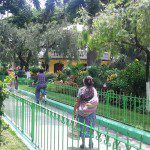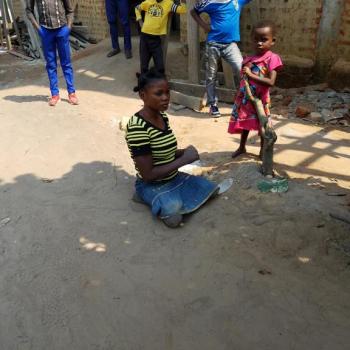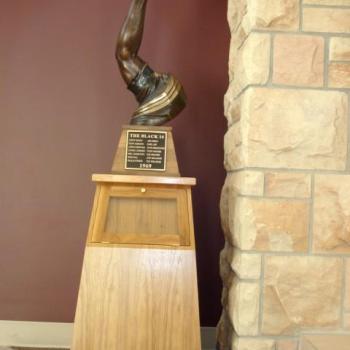 1 John 2:16 – For all that [is] in the world, the lust of the flesh, and the lust of the eyes, and the pride of life, is not of the Father, but is of the world.
1 John 2:16 – For all that [is] in the world, the lust of the flesh, and the lust of the eyes, and the pride of life, is not of the Father, but is of the world.
I am a living testimony to the fact that God loves even stupid people. I probably deserved to be kidnapped and killed the day I made that trip. But since I’m here writing this, I stand as a witness of God’s mercy.
In Momostenango, a leader of a BYU group had urged his students to steer clear of me, as I was likely a bad influence. I don’t recall the details, but I understand why this leader had problems with me. I was argumentative and I trivialized the BYU program because it was so puny compared to what Dale Gordon was doing elsewhere. Of course, I didn’t see my contribution to the problem back then; I just felt more in sync with Dale–persecuted because I saw a wider perspective than the BYU group did. My feelings were hurt, and I wanted to go back to Dale’s plantation, where my dad was. And so I packed my meager belongings, said goodbye to the family I was living with, and caught a bus for Guatemala City, where I would transfer to a second bus.
It was nearing dusk by the time I reached the bus depot in Guatemala City. Dozens of buses sat next to a chaotic marketplace. I was hungry. The constant, swirling noise and the smells of grilled beef, dried fish, sugar, and roasted or boiled corn made me dizzy. I wound my way between buses, looking for the name “Coban.” I shook my head at the dozens of vendors who approached me with their plates of chiles rellenos, fried platanos, packets of gum, and depictions of the Virgin Mary. Though I hadn’t eaten all day, I couldn’t have bought their wares. I had no money to spare. Besides, I was in a hurry. I didn’t even know if the bus for Coban had already left. Someone lifted his chin to direct me to it; someone else asked me to give him “jes one leetel keese.” I shook my head again. There were so many buses and so many vendors.
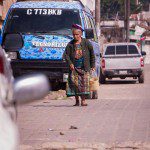 Finally, I saw it: the bus labeled “Coban.”
Finally, I saw it: the bus labeled “Coban.”
Some refer to Guatemalan buses as “chicken buses” because they’re so crowded and because chickens are indeed frequent passengers–carried in boxes or baskets towards their slaughter. At that moment, I didn’t care what species my fellow-riders were. I paid, boarded, and sat down. A few moments later, a middle-aged Latina woman got on and set her bags on the rack opposite me. Our eyes met briefly. She left the bus for a minute, returned, and then moved her bags to the rack on my side. Then she sat on the seat just in front of me.
We didn’t begin any conversation until the bus was well on its way to Coban, when she turned, politely asked my name (“Margarita”) and where I was from.
“Los Estados Unidos, Norteamerica,” I said, though I suspected that was obvious.
“Que parte?”
“Utah.”
Her eyes widened. “Eres Mormona?”
Was I a Mormon? In this 98% Catholic country, how many people knew that the state of Utah in Norteamerica was mostly Mormon?
“Si.”
“Yo tambien.”
She was a Latter-day Saint too. God had sent me an angel!
My angel asked where I was going in Coban, and I named the finca. She shook her head and said the finca was much further away than I had supposed, and it was hard to get to. I would be spending the night at her home, she announced, and in the morning her son would drive me to my dad. Her son happened to work on that particular finca.
That’s how it happened, how God in his mercy guided me to a woman who fed me, provided me a bed, and then a way to my dad. As she and I ate sweetbread and chatted, she told me she hadn’t planned to sit next to me on that bus, but that she suddenly knew she was supposed to. She was in the habit of listening, and so obeyed the impression.
Of course, Dad hadn’t expected me. He hugged me when I walked up the hill to his “office” (the monster bus), and then we talked.
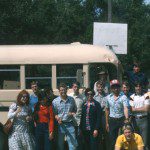 I told him that I had been ostracized by the BYU group and that I had decided to come and live with him at the finca. Dad answered solemnly. “Let’s get on the bus.” It was only a few yards away, and nobody else was in it.
I told him that I had been ostracized by the BYU group and that I had decided to come and live with him at the finca. Dad answered solemnly. “Let’s get on the bus.” It was only a few yards away, and nobody else was in it.
We sat, and Dad said, “You are not to come here.” This was completely unexpected.
“Why?” I asked.
Dad’s eyes teared up. “Dale has apostatized,” he said. He then told me a part of the story. Dale had given his wife, Angela, a “blessing” informing her that she needed to prepare herself to die, because she would die with the birth of the child she was carrying. Dad had learned that from Angela. Not only would she die, but Dale already had her replacement picked out, and he had brought her to the finca so that their children could get acquainted with her.
Dad had asked Angela, “Has Dale talked about polygamy?”
“Yes.”
“How do you feel about that?”
“Oh, Bob–I can’t!” she said.
Dad then asked her if she would like a blessing from him. She said she would. He laid his hands upon her head and blessed her that she would survive her child’s birth, and that the baby would also survive. (We later learned that a missionary had discovered the same information and had also given Angela a blessing that she would survive.) Dad had confronted Dale with the information, and then had resigned as Chairman of the Board. He remained on the finca until the RMs completed their dictionary work, but spoke very little to Dale.
The specter of polygamy, long since disavowed by Latter-day Saints, haunted the finca as we came to understand the full implications of hints we had ignored. From what my father had learned, it appeared that the little paradise was becoming a Fundamentalist Mormon organization. In a dark epiphany, a frightening side of Dale had been revealed, and we recognized the meaning behind riddle-ish statements he had made, and which we had ignorantly laughed at. We saw that Dale was the centerpiece of a fantasy in which he was the exception to the most basic commandments, commandments which Dad took absolutely seriously. And Dale was spreading a gospel which featured him and his projects, easily dismissing any who did not support his work–including his wife.
I remained for only a few days. I spent a few minutes with Dale, not telling him how much I knew. He told me with a wink that I had a special calling, and would be “let’s say, an assistant” to him. I winced.
I had an invitation to work with a literacy project in Mexico City, and so decided to go there at once. Dad told me to find Elder Bradford–the man we had spoken of so negatively just a few weeks earlier–and tell him what was happening. I promised that I would. We knew that he lived in Mexico City. We did not know that he would be the one who would “set apart” all of us working on the literacy project, including me. Indeed, I would not have to seek Elder Bradford. Our meeting was already scheduled.
To be continued . . .


